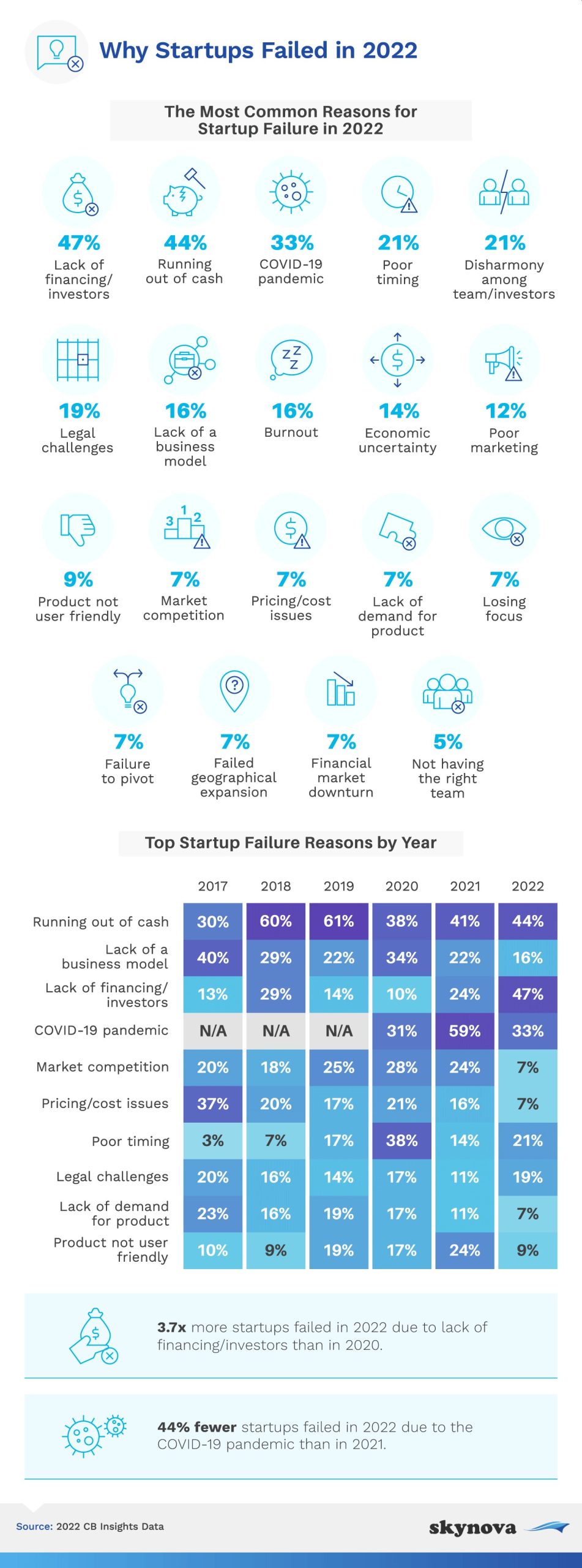Last December, we dedicated an article to reflect upon the startups that didn’t make it through 2022. The previous year posed unique challenges for technology companies, particularly startups. As we’ve consistently highlighted, the startup landscape is notorious for its high failure rate. A staggering 90% of startups fail.
Not surprisingly, startup failures can occur at various funding stages, and the reasons for these failures can differ based on the development phase of the company. According to a Medium post by Sebastian Quintero, the failure rate of startups decreases as they progress through the funding stages. This is partly because more established startup companies are more likely to exit. Here are some findings of startup failure rates by stage:
- 20% of startups fail within the first year
- 30% of startups fail within the first two years
- 60% of startups fail between pre-seed and Series A funding stages
- 35% of Series A startups fail before Series B
The most critical period for startup failures falls within the second to fifth years of operation, with just 30% of startups managing to survive beyond a decade. However, there’s a notable shift in the failure rate, plummeting to a mere 1% once a startup progresses beyond the Series B funding round. Startups that effectively navigate the challenges of Series A and progress to Series B are positioned for a significantly higher likelihood of achieving long-term success.
Overeall, two major factors underpinning startup failures are a lack of market-product fit, and, quite simply, running out of financial resources to sustain their projects. Now, new insights from SkyNova further support our findings about why most startups fail.
To get to the bottom of why startups failed, SkyNova conducted a survey involving approximately 500 startup founders, aiming to understand their experiences, successes, setbacks, and potential changes they would make if given the chance during their initial business stages. Additionally, the firm also delved into a five-year dataset of startup failures from CB Insights to identify the root causes of these shortcomings.
Lack of Funding
Following extensive data analysis and insights from founders, the SkyNova team found that the primary reason for startup failures is a shortage of funding or a lack of investor interest, constituting almost half of these failures. Running out of financial resources closely follows as another prevalent cause. Surprisingly, although the COVID-19 pandemic has impacted numerous businesses, it ranked as the third most frequent reason for startup failures, responsible for about one-third of them.

Pivotal Strategies
Achieving success amid adversity and disaster necessitates a keen awareness of obstacles and the ability to adapt. Startups are no exception. How inclined were businesses to shift from their initial strategies, and what strategies proved effective in these transformations?
Nova’s study found that adaptability and flexibility were identified as crucial traits for businesses to navigate challenging times successfully. In 2022, 40% of startup founders had to pivot their strategies to avoid failure. The effectiveness of these pivots varied, with women expressing more confidence in their strategies than men.

Founders’ Recommendations for Success
Finally, the founders offered recommendations and valuable advice for aspiring founders, and business owners, emphasizing the importance of research, a robust business plan, and listening to customers. Learning from past mistakes was regarded as the most vital skill to cultivate.

Methodology
The SkyNova team conducted a survey of 492 startup founders in November 2022. The survey revealed that 50% were male, 47% were female, and 3% identified as nonbinary. In addition, the team also analyzed data from CB Insights Startup Failure Post Mortems to identify the prevailing causes behind startup failures over the past five years.
In conclusion, startup success in 2022 hinged on factors like funding, adaptability, and meticulous planning. While challenges were abundant, a combination of strategic thinking and adaptability proved to be the keys to thriving in a dynamic business landscape. You can read the full report here.
- SEO Powered Content & PR Distribution. Get Amplified Today.
- PlatoData.Network Vertical Generative Ai. Empower Yourself. Access Here.
- PlatoAiStream. Web3 Intelligence. Knowledge Amplified. Access Here.
- PlatoESG. Carbon, CleanTech, Energy, Environment, Solar, Waste Management. Access Here.
- PlatoHealth. Biotech and Clinical Trials Intelligence. Access Here.
- Source: https://techstartups.com/2023/09/19/91-of-startups-fail-here-are-the-top-25-reasons-why-startups-fail-in-2022/
- :has
- :is
- 2022
- 25
- 500
- 90
- a
- ability
- About
- abundant
- According
- achieving
- adapt
- adaptability
- addition
- Additionally
- advice
- Aiming
- All
- almost
- also
- Although
- Amid
- an
- analysis
- analyzed
- and
- Another
- approximately
- ARE
- article
- AS
- aspiring
- At
- avoid
- awareness
- b
- based
- BE
- because
- before
- behind
- between
- Beyond
- Bottom
- business
- business owners
- business plan
- businesses
- by
- CAN
- Cause
- causes
- CB
- CB Insights
- challenges
- challenging
- challenging times
- Chance
- Changes
- closely
- combination
- Companies
- company
- conclusion
- conducted
- confidence
- consistently
- COVID-19
- COVID-19 pandemic
- critical
- crucial
- Cultivate
- Customers
- data
- data analysis
- decade
- December
- decreases
- dedicated
- Development
- differ
- disaster
- during
- dynamic
- Effective
- effectively
- effectiveness
- emphasizing
- established
- exception
- Exit
- Experiences
- expressing
- extensive
- factors
- FAIL
- Failed
- Failure
- Falls
- female
- fifth
- financial
- findings
- Firm
- First
- fit
- five
- Flexibility
- follows
- For
- found
- founders
- frequent
- from
- full
- Full Report
- funding
- Funding Round
- further
- get
- given
- had
- Half
- here
- High
- higher
- Highlighted
- How
- However
- HTTPS
- identified
- identify
- if
- impacted
- importance
- in
- Inclined
- initial
- insights
- interest
- into
- investor
- involving
- IT
- ITS
- jpg
- just
- Keen
- keys
- Lack
- landscape
- learning
- like
- likelihood
- likely
- Listening
- long-term
- major
- make
- managing
- Men
- mere
- meticulous
- mistakes
- more
- most
- Navigate
- necessitates
- New
- no
- notable
- notorious
- November
- now
- numerous
- obstacles
- occur
- of
- offered
- on
- once
- One-third
- operation
- or
- our
- out
- over
- owners
- pandemic
- particularly
- past
- percent
- period
- phase
- Pivot
- Pivots
- plan
- planning
- plato
- Plato Data Intelligence
- PlatoData
- posed
- positioned
- Post
- potential
- pre-seed
- prevailing
- prevalent
- previous
- primary
- Progress
- projects
- proved
- ranked
- Rate
- Rates
- Read
- reason
- reasons
- recommendations
- reflect
- regarded
- report
- research
- Resources
- responsible
- Revealed
- robust
- root
- round
- running
- Second
- Series
- Series A
- Series A funding
- Series B
- Setbacks
- shift
- shortage
- shortcomings
- significantly
- simply
- skill
- some
- Stage
- stages
- startup
- startup companies
- Startups
- Strategic
- strategies
- Study
- success
- Successfully
- support
- Survey
- survive
- team
- Technology
- technology companies
- than
- that
- The
- their
- Them
- These
- they
- Thinking
- Third
- this
- thriving
- Through
- times
- to
- top
- transformations
- two
- underpinning
- understand
- unique
- upon
- Valuable
- various
- vital
- was
- we
- were
- What
- while
- why
- with
- within
- Women
- would
- year
- years
- you
- zephyrnet












